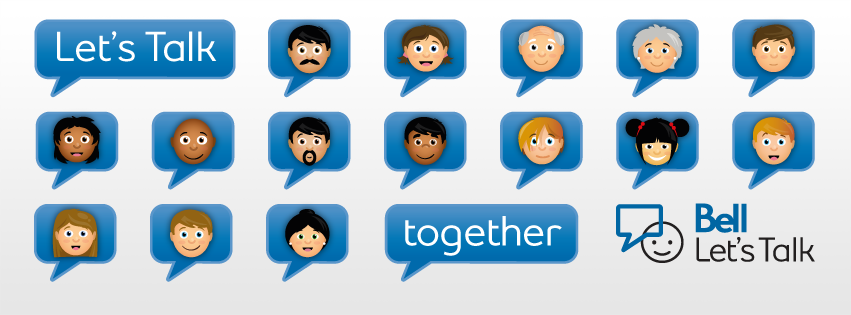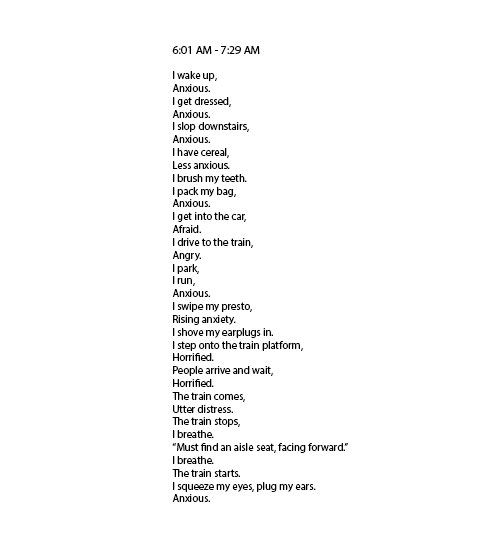
BY ERIN QUEENAN
“For some people, its the ads,” says Mary Deacon, chairman of Bell Let’s Talk Canada, an annual event to raise money for mental health and reduce its stigma.
Tomorrow, on Jan. 27, for every tweet with the hashtag #BellLetsTalk, Facebook share of their image, and text and mobile or long distance call by a Bell customer, Bell will donate 5 cents to mental health group.
Last week, Let’s Talk received an email from someone who saw the new advertisements promoting this year’s campaign. Two of the ads feature a conversation that shows what stigmatizing sounds like.
“I saw those ads and thought they were interesting. Then later, I was just about to say something stigmatizing and checked myself, remembering that commercial. It really made me reflect and behave different,” the emailer wrote.
This is what it’s all about for Deacon. Before she became chairman at Bell Let’s Talk, for 25 years she held a series of senior positions in the not-for-profit sector including almost a decade as the inaugural President of the Centre for Addiction and Mental Health Foundation – Canada’s largest mental health hospital.
“Mental health is a big issue. The challenges are huge. The investment needed is also huge. But there’s something that each and every one of us can do. You don’t need to be a doctor to have a profound impact on mental health” says Deacon in a telephone interview.
Since 2010, when the annual day started, Bell has donated $100 million to mental health programs. What’s more, the conversations started from the annual event have begun to normalize discussions about mental health.
“Bell decided to take a bold leadership decision. It’s time for mental health to take it’s rightful place as a high priority in discussion,” says Deacon.
Celebrity spokesmen for the campaign includes Canadian Olympian athlete Clara Hughes, Michael Landsberg, Howie Mandel and Serena Ryder. Videos of each celebrity speaking out about their illness feature on the website homepage.

(Photo from Bell)
Prime Minister Justin Trudeau is also an advocate for the cause. An episode of CTV’s The Social will air tomorrow, in which Trudeau will touch on government policies about mental health and his own experiences.
Although Bell Let’s Talk Day is once a year, they call themselves a multi-year charitable program. The money raised on Jan. 27 is donated to programs throughout the year. Earlier this month, Bell and RBC together donated $1 million to a program called RISE Asset Development, which provides low interest, small business loans, training and mentorship to entrepreneurs with a history of mental health or addiction challenges.
The organization was started by philanthropist Sandy Rotman and is the first of its kind in Canada. Rotman, has had her own personal struggle and history of mental health challenges in her family. When she traveled to organizations supporting people with mental health issues, she was really struck by the talent of the people and their business ideas and wanted to start something to support that.
Jodi Butts the executive director of RISE said in a telephone interview, by donating and holding the Bell Let’s Talk day annually, “Bell is demonstrating their corporate leadership. They are the first company to make this kind of multi-year investment.”
The money donated will go towards RISE’s loan capital, their business advisor services and towards building an expansion plan for RISE to go Canada-wide.
RISE is about rebutting the stereotype that people with mental health challenges are “lazy, talentless, sick all the time and unable to make contributions.”
“We’re a great country of diversity. We’re successful because of our differences not in spit of them and we need to bring mental health into that,” says Butts.
RELATED LINKS
- More information on Bell Let’s Talk
- Sheridan students talk about stigma
- Eating disorders at Sheridan college
Jess Crawford, 22, a third year nursing student at Ryerson University has anxiety and depression. She says it can be really hard for people to understand what its like to have mental health issues which makes it hard for her to open up. And when it is brought up people usually don’t know how to respond.
“If someone had a broken arm you would say, I’m so sorry what can I do to help. Mental illnesses shouldn’t be treated differently.”
Last fall Crawford tried a challenge called “100 happy days.” A movement designed to arouse gratitude and awareness. The challenge consists of posting every day for 100 days about something that made you happy with the hashtag #100happydays.
Inspired by one of her university professors, Norm Javier, who has been posting for 600 days now, Crawford wanted to try to find the positivity in her life.
However, not every day is a good day for those with mental health and instead of hiding the ugly parts, Crawford decided to be boldly honest about her daily struggles.
I feel as though I am looked at like I cried wolf. I feel worthless and stupid. My everyday life, or what it feels like in this dark mood, is exhausting for the basic tasks of eating and travelling and being out and about. You know that feeling you get when you’re in a car and you fly over a bump and your stomach drops? Or the one you get when you have the stomach flu and things aren’t settled? How about when a space shuttle takes off beside your ear? Or a pack of jaguars is nearing you? Try and feel these every waking hour if every day #100daysofhappiness.
Her posts, although not always positive, were always honest and the response on Facebook was huge. More than 40 people messaged her directly, opening up about their own mental health struggles and Crawford didn’t receive one negative comment.
Even friends she hadn’t talked to since fourth grade, personal messaged her saying, “it’s awesome what you’re doing and this is what I’m going through. What you’re doing is enabling people and empowering them to make a change. Recognize you’re not alone.”
Crawford is excited about Bell Let’s Talk Day. “It’s very publicized and prominent nationwide. There are many famous Canadians supporting it.”
It’s Mary Deacon’s dream that Crawford’s generation of young people can live stigma free.
“What that will mean for our country will be profound.”

